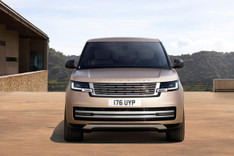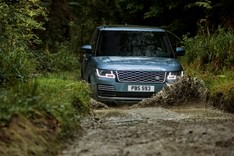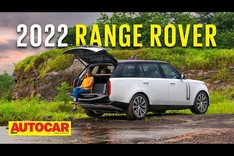The all-electric Range Rover – which will be the first Land Rover EV from JLR (the new official name for Jaguar Land Rover) – will make its global debut by 2024. The EV will be built at the Solihull production facility in the UK, and bookings will open later this year.
- Range Rover EV will be based on MLA platform
- MLA platform to spawn other EVs in the future
- The platform can also accommodate hydrogen powertrains
Range Rover EV MLA platform
Like its donor car, the Range Rover EV will be based on the MLA platform, which supports both hybridised ICE and fully electric powertrains. JLR bills the Range Rover EV as the “world’s first electric luxury SUV”.
JLR’s vehicle programme director Nick Collins said it would “deliver true Range Rover values”, including “off-road ability, usability and refinement” in an “uncompromised” approach. He added: “It will be a benchmark for refined luxury and a testament for what this brand will create.”
The MLA platform will spawn other EVs in the future as part of JLR’s pledge to have an electric model under each of its four brands (Range Rover, Discovery, Defender and Jaguar) by 2026, an electric model in each of its model ranges by 2030 and for every car it sells to be electric by 2036.
Range Rover EV battery
The electric Range Rover will initially use batteries sourced from an external supplier, before it switches to using cells made by JLR parent company Tata Motors when it has its gigafactory online within the next five years. JLR CEO Adrian Mardell confirmed that this battery supply deal was secure and that it wouldn't slow down the launch of the new car next year.
All Land Rover models will offer a fully electric powertrain option by the end of the decade in line with the brand’s ambition to achieve a 60 percent EV sales mix by that point. The electric Range Rover, which will serve as a rival to the BMW iX and Mercedes-Benz EQS SUVs, remains under wraps (even camouflaged prototypes have yet to hit public roads), but visually it's unlikely to differ substantially from the ICE-powered car.
The subtle evolution of the Range Rover’s design over the years suggests its recognisable silhouette is intrinsic to the model name, so it's likely to be maintained for all powertrain variants.
Originally, it was planned that Land Rover’s first EV would share the MLA underpinnings with the long-promised electric Jaguar XJ, but that model was cancelled as it was deemed incompatible with then CEO Thierry Bolloré’s vision for the brand.
The electric Range Rover could be one of the first production models to benefit from a new development partnership between JLR and BMW, which will have the German and British firms collaborate on electric drive systems. Whether these systems will bear any relation to those used by BMW’s current EVs – or indeed JLR's own Jaguar I-Pace – is unclear, but it's almost certain that an electric Range Rover would feature two driven axles and have similar power figures to the most potent ICE car.
Range Rover’s hydrogen plans
Interestingly, Land Rover programme director Nick Miller previously told our sister publication Autocar UK that the MLA architecture can also readily accommodate a hydrogen powertrain, which means a Range Rover FCEV could be on the cards as the company’s Project Zeus hydrogen development programme continues.
Land Rover was previously testing a hydrogen-fuelled Defender prototype, and says hydrogen will be “complementary” to battery-electric technology across its line-up as it strives to achieve zero tailpipe emissions by 2036.
A drivable fuel-cell concept is due to be revealed at some point in the near future. The vehicle will give Land Rover an opportunity to show off how hydrogen could be a more appropriate alternative fuel than batteries for its models, which are typically larger and heavier and prioritise long-distance refinement.










Comments
Member Login
Personal Details
No comments yet. Be the first to comment.